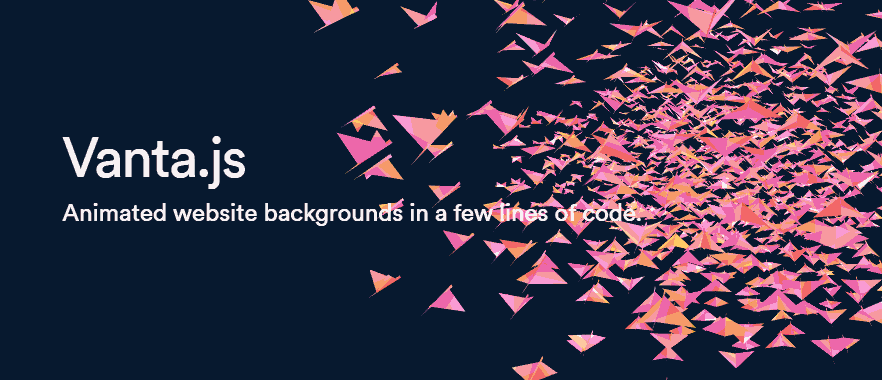Package Exports
- vanta
- vanta/dist/vanta.fog.min
- vanta/dist/vanta.fog.min.js
- vanta/src/_base.js
This package does not declare an exports field, so the exports above have been automatically detected and optimized by JSPM instead. If any package subpath is missing, it is recommended to post an issue to the original package (vanta) to support the "exports" field. If that is not possible, create a JSPM override to customize the exports field for this package.
Readme
Vanta JS
View demo gallery & customize effects at www.vantajs.com →
What is Vanta? / FAQs
- Add 3D animated digital art to any webpage with just a few lines of code.
- How it works: Vanta inserts an animated effect as a background into any HTML element.
- Works with vanilla JS, React, Angular, Vue, etc.
- Effects are rendered by three.js (using WebGL) or p5.js.
- Effects can interact with mouse/touch inputs.
- Effect parameters (e.g. color) can be easily modified to match your brand.
- Total additional file size is ~120kb minified and gzipped (mostly three.js), which is smaller than comparable background images/videos.
- Vanta includes many predefined effects to try out. More effects will be added soon!
View demo gallery & customize effects at www.vantajs.com →
Basic usage with script tags:
<script src="https://cdnjs.cloudflare.com/ajax/libs/three.js/r134/three.min.js"></script>
<script src="https://cdn.jsdelivr.net/npm/vanta/dist/vanta.waves.min.js"></script>
<script>
VANTA.WAVES('#my-background')
</script>More options:
VANTA.WAVES({
el: '#my-background', // element selector string or DOM object reference
color: 0x000000,
waveHeight: 20,
shininess: 50,
waveSpeed: 1.5,
zoom: 0.75
})el: The container element.
- The Vanta canvas will be appended as a child of this element, and will assume the width and height of this element. (If you want a fullscreen canvas, make sure this container element is fullscreen.)
- This container can have other children. The other children will appear as foreground content, in front of the Vanta canvas.
mouseControls: (defaults to true) Set to false to disable mouse controls. Only applies to certain effects.
touchControls: (defaults to true) Set to false to disable touch controls. Only applies to certain effects.
gyroControls: (defaults to false) Set to true to allow gyroscope to imitate mouse. Only applies to certain effects.
NOTE: Each effect has its own specific parameters. Explore them all at www.vantajs.com!
Updating options after init:
const effect = VANTA.WAVES({
el: '#my-background',
color: 0x000000
})
// Later, when you want to update an animation in progress with new options
effect.setOptions({
color: 0xff88cc
})
// Later, if the container changes size and you want to force Vanta to redraw at the new canvas size
effect.resize()Cleanup:
const effect = VANTA.WAVES('#my-background')
effect.destroy() // e.g. call this in React's componentWillUnmountUsage with React Hooks:
npm i vanta, then import a specific effect as follows. Make sure three.js or p5.js has already been included via <script> tag.
import React, { useState, useEffect, useRef } from 'react'
import BIRDS from 'vanta/dist/vanta.birds.min'
// Make sure window.THREE is defined, e.g. by including three.min.js in the document head using a <script> tag
const MyComponent = (props) => {
const [vantaEffect, setVantaEffect] = useState(null)
const myRef = useRef(null)
useEffect(() => {
if (!vantaEffect) {
setVantaEffect(BIRDS({
el: myRef.current
}))
}
return () => {
if (vantaEffect) vantaEffect.destroy()
}
}, [vantaEffect])
return <div ref={myRef}>
Foreground content goes here
</div>
}Usage with React Classes:
npm i vanta, then import a specific effect as follows. Make sure three.js or p5.js has already been included via <script> tag.
import React from 'react'
import BIRDS from 'vanta/dist/vanta.birds.min'
// Make sure window.THREE is defined, e.g. by including three.min.js in the document head using a <script> tag
class MyComponent extends React.Component {
constructor() {
super()
this.vantaRef = React.createRef()
}
componentDidMount() {
this.vantaEffect = BIRDS({
el: this.vantaRef.current
})
}
componentWillUnmount() {
if (this.vantaEffect) this.vantaEffect.destroy()
}
render() {
return <div ref={this.vantaRef}>
Foreground content goes here
</div>
}
}Usage with Vue 2 (SFC):
<template>
<div ref='vantaRef'>
Foreground content here
</div>
</template>
<script>
import BIRDS from 'vanta/dist/vanta.birds.min'
// Make sure window.THREE is defined, e.g. by including three.min.js in the document head using a <script> tag
export default {
mounted() {
this.vantaEffect = BIRDS({
el: this.$refs.vantaRef
})
},
beforeDestroy() {
if (this.vantaEffect) {
this.vantaEffect.destroy()
}
}
}
</script>Using THREE or p5 from npm
For effects that use three.js, you can import three from npm, and pass it into the effect function.
import React from 'react'
import * as THREE from 'three'
import BIRDS from 'vanta/dist/vanta.birds.min'
...
componentDidMount() {
this.vantaEffect = BIRDS({
el: this.vantaRef.current,
THREE: THREE // use a custom THREE when initializing
})
}
...For effects that use p5.js, you can import p5 from npm, and pass it into the effect function.
import React from 'react'
import p5 from 'p5'
import TRUNK from 'vanta/dist/vanta.trunk.min'
...
componentDidMount() {
this.vantaEffect = TRUNK({
el: this.vantaRef.current,
p5: p5 // use a custom p5 when initializing
})
}
...Local dev:
Clone the repo, switch to the gallery branch, run npm install and npm run dev, and go to localhost:8080.
Credits
General inspiration from shadertoy.com, #generative, /r/generative, /r/creativecoding, etc
Birds effect from https://threejs.org/examples/?q=birds#webgl_gpgpu_birds by @zz85
Fog effect from https://thebookofshaders.com/13/ by @patriciogonzalezvivo
Clouds effect from https://www.shadertoy.com/view/XslGRr by Inigo Quilez
Clouds2 effect from https://www.shadertoy.com/view/lsBfDz by Rune Stubbe
Trunk, Topology effects from http://generated.space/ by Kjetil Midtgarden Golid @kgolid
